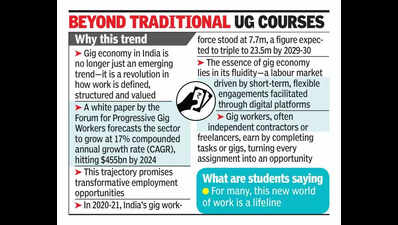Mumbai: After classes every day, Ruia College student Aarti Rangarajan* races 30km north of the city to start her shift at a call centre. Priyanka Vasudeva, who studies at R D National College in Bandra, heads to a bustling mall by 11am, carefully arranging the display window with sports equipment before the first customers arrive. South Mumbai’s Prerit Mehta, driven by his love for finance, sells mutual funds while SIWS College student Shikha Ahuja expresses her creativity by working in an animation studio.
Each of these late-teenagers balances their dreams with the academic demands of college life. Campus years which were once marked by canteen capers, first-day-first-show outings and weekend treks, are being reshaped by ambition and hustle in an age of gig economy. While educationists rue the fact that many students who “work” stay away from classrooms—attendance in some classes has dipped to 20%, say principals—and have poor academic scores, youngsters who earn in five-digits before turning 20 feel justified in putting education in the “backseat”.
Twenty-year-old Angad Singh Nagpal, a visually impaired final-year BMS student from St Xavier’s College, has emerged as an automobile influencer with 55.7k followers on Instagram although he is unable to drive. Wadala resident Nagpal credits his success to his love for cars: “I spoke my dad’s car’s name before I could say his own”. A brand ambassador for a German car manufacturer, Nagpal is busy during his off-campus hours finalising deals and marketing collaborations. His peers hail him as the SEO “Guru” due to his mastery of search engine optimisation.
It’s a growing trend, said Professor Pritesh Arte of St Xavier’s College near CSMT. “From shooting videos to setting up social media channels, from selling mutual funds to modelling, students today are redefining what it means to be in college,” Arte said. He said there has been a “dramatic shift” after Covid-19 with side hustles becoming the norm instead of being an exception.
For many, this trend is not about financial necessity, but an “adjustment to Mumbai’s rhythm”. According to Arte, “Students who come from outside the city see the lifestyle here and feel compelled to join in. They find their own avenues to belong.” When one student starts something, it has a multiplier effect, said Arte, adding that the new generation is anxious to blend ambition with experience and financial independence. Himanshu Dawda, principal of R Jhunjhunwala College in Ghatkopar, said: “There’s a perception that students in less demanding courses dabble in side hustles, but almost 60% of the campus is engaged in such pursuits.”
Psychology faculty Meghna Basu Thakur said students are reshaping their world. “They’re working in malls, crafting soaps and candles, running their own bakeries. Some are influencers, makeup artists, coders, even lending their voice to films. The vast gig economy is brimming with possibilities, and students are signing up, embracing more roles than ever before,” she added.
Students from conservative families, too, have taken up the work-while-you-study routine seriously—and it’s no longer about making pocket money by taking tuitions. “There are girls who team up and take orders to apply mehendi during large weddings and other functions. Some drape sarees beautifully and take up such assignments. No one wants to be just a college student,” said the professor.
But the bustling energy has hit campus life hard: The average annual attendance in several campuses has plummeted to just 10%-20%. More students are burdened with a growing backlog of ATKTs —academic allowances that let them advance to the next year despite failing a few subjects.
“Everyone is immersed in something beyond the traditional undergraduate programme,” said Parag Ajagaonkar, principal of N M College, Juhu. He recalled a casual pow-wow he took among various students of his college about “what after college” and found a vivid mosaic. “While many were navigating rigorous paths of professional courses like CA or CFA, there were others carving out their own entrepreneurial ventures. Co-curricular activities, once a peripheral pursuit, have surged into the mainstream,” he said.
The restless generation, as he calls the youngsters, are sharper, more tech-savvy and impressively informed. However, they carry a heavier burden of expectations. “The resilience to face failure, to endure the wait for success, has thinned alarmingly,” said Ajagaonkar, paving the way for anxiety, stress, and, in some cases, depression. (*Names of some students changed on request)




